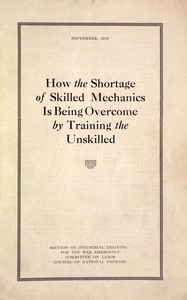| Author |
United States. Council of National Defense. Committee on Labor. Section on Industrial Training for the War Emergency |
| Title |
How the shortage of skilled mechanics is being overcome by training the unskilled
|
| Original Publication |
United States: Department of Labor, 1918.
|
| Credits |
Bob Taylor, Charlene Taylor and the Online Distributed Proofreading Team at https://www.pgdp.net (This file was produced from images generously made available by The Internet Archive/American Libraries.)
|
| Summary |
"How the Shortage of Skilled Mechanics is Being Overcome by Training the Unskilled" is a publication focused on industrial training during World War I, released in the early 20th century. The work is organized by the Council of National Defense and highlights efforts and policies aimed at addressing a significant labor shortage in skilled mechanics to meet wartime production needs. The likely topic of the book is the structured approach to training unskilled workers effectively and efficiently, emphasizing the collaboration between labor, employers, and educators to maintain production demands. The opening of the publication sets the stage for discussing the urgent labor shortage of skilled workers, which was exacerbated by wartime industry demands. It highlights training programs initiated by various factories, showcasing how they were adapting their workforce through rapid, intensive training methods rather than traditional apprenticeship. Different committees, representing labor, employers, and educational institutions, collaborated to establish training departments where unskilled workers could quickly learn specific tasks relevant to wartime productions, ensuring a skilled workforce could be ramped up to meet urgent national needs. (This is an automatically generated summary.)
|
| Language |
English |
| LoC Class |
T: Technology
|
| Subject |
World War, 1914-1918 -- Economic aspects -- United States
|
| Subject |
Technical education -- United States
|
| Subject |
Mechanics (Persons)
|
| Subject |
Unskilled labor -- United States
|
| Category |
Text |
| EBook-No. |
71125 |
| Release Date |
Jul 5, 2023 |
| Copyright Status |
Public domain in the USA. |
| Downloads |
741 downloads in the last 30 days. |
|
Project Gutenberg eBooks are always free!
|

